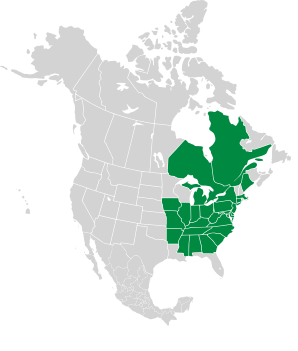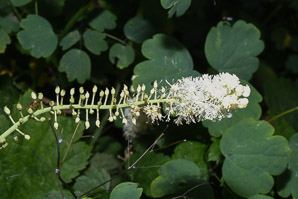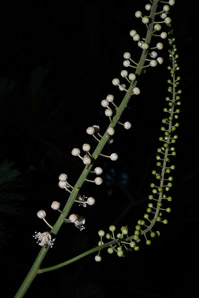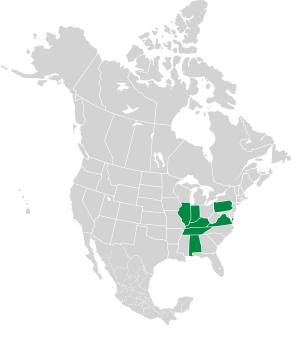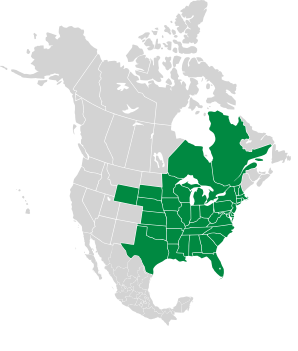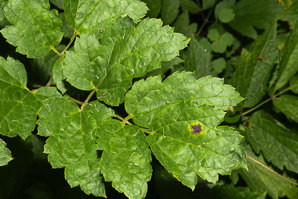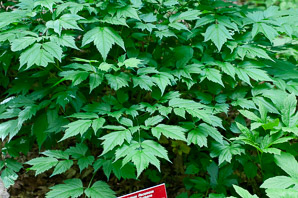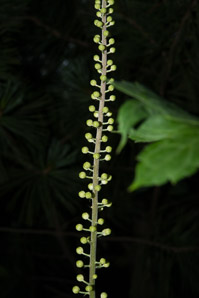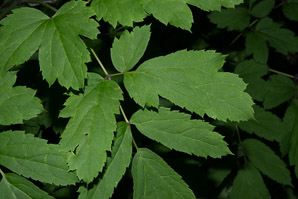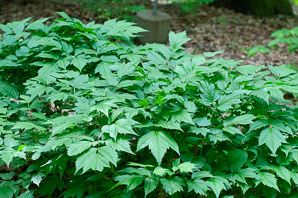
|
Actaea racemosa L. Black snakeroot, black baneberry, black bugbane, black cohosh, fairy candle
Black snakeroot is native to eastern North America. Identification: Plants reach 10-24″ (25-60 cm). On all of the baneberries, leaves often occur in groups of three, on thin stems, and are saw-toothed. White flowers form on tall stalks up to 8′ (2.5 m) in height, with the flowering portions up to 1½′ (50 cm) tall. Don't confuse black snakeroot with the unrelated plant, Canadian black snakeroot. Both of these plants are found in eastern Canada and the eastern United States. |
7/31/2016 · Skyline Drive, Shenandoah National Park, Virginia 7/6/2013 · Mike and Ellen’s, Shohola, Pennsylvania · ≈ 7 × 10″ (16 × 25 cm) |
||||||||||||||||||||||||||||
|
Some similar plants: | |||||||||||||||||||||||||||||
| You are here Actaea racemosa |
Actaea rubifolia |
Sanicula canadensis |
|||||||||||||||||||||||||||
|---|---|---|---|---|---|---|---|---|---|---|---|---|---|---|---|---|---|---|---|---|---|---|---|---|---|---|---|---|---|
| Common Name |  |
 |
 |
||||||||||||||||||||||||||
| Plant | Plants reach 10-24″ (25-60 cm). | Plants are 12-55″ (30-140 cm) tall. | Plants are 1-2′ (30-60 cm) high. Stems are light green, sometimes furrowed. | ||||||||||||||||||||||||||
| Flowers | White flowers form on tall stalks up to 8′ (2.5 m) in height, with the flowering portions up to 1½′ (50 cm) tall. | White flowers form long, attractive, feathery-looking spikes 6-24″ (15-60 cm) long, straight or slightly curved. Individual flowers have 5 sepals and are about ⅜″ (9.5 mm) in diameter. | Small clusters, greenish-white, not especially interesting. | ||||||||||||||||||||||||||
| Leaves | Leaves often occur in groups of three, on thin stems, and are saw-toothed. | Toothed, shaped like maple leaves. Leaflets are 6-12″ (15-30 cm) long. | In groups of three, and are less than 3″ (7.6 cm) long. | ||||||||||||||||||||||||||
| Fruit | Black or dark brown seeds. | Fruits are ⅛″ (3 mm) around, and reddish brown. | Seed pods are about ½″ (1.3 cm) in diameter, and resemble burrs, with small hooks. | ||||||||||||||||||||||||||
| Range/ Zones |
|
|
|
||||||||||||||||||||||||||
| Habitats | Rich soils in moist woods, ravines | Rich woods, open rocky woods, thickets | |||||||||||||||||||||||||||
| Type | Wild | Wild | Wild | ||||||||||||||||||||||||||
| Occurrence | Common | Endangered | Common | ||||||||||||||||||||||||||
Edibility: Most members of the buttercup family, including other species of Actaea, are poisonous. Though black snakeroot is not considered a strong poison, its use for medicinal purposes is not adequately supported or refuted by scientific studies. (See the Wikipedia article below, or this article from the National Center for Complementary and Alternative Medicine.) Liver damage has been reported in a few cases.
Online References:
The Massachusetts Division of Fisheries and Wildlife Natural Heritage & Endangered Species Program (PDF)
The Lady Bird Johnson Wildflower Center (Actaea racemosa var. racemosa)
The Plants of the Eloise Butler Wildflower Garden
7/31/2016 · Skyline Drive, Shenandoah National Park, Virginia 
5/22/2010 · Garden in the Woods, Framingham, Massachusetts 
Actaea racemosa description by Thomas H. Kent, last updated 6 May 2023.
© FloraFinder.org. All rights reserved.
7/6/2013 · Mike and Ellen’s, Shohola, Pennsylvania · ≈ 5 × 8″ (13 × 19 cm) 
7/6/2013 · Mike and Ellen’s, Shohola, Pennsylvania · ≈ 12 × 8″ (31 × 21 cm) 
5/22/2010 · Garden in the Woods, Framingham, Massachusetts 
Range:
